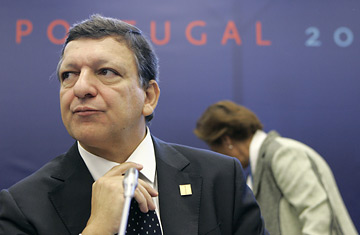
European Commission President Jose Manuel Barroso adjusts his tie during a Tripartite Informal Social Summit in Lisbon, Thursday, Oct. 18, 2007
Forging a new legal framework for the greatly expanded European Union has been a six-year saga with plenty of woe. It finally reached a provisional end on Friday in Lisbon, when leaders of the 27 member states agreed to sign a new document that replaces the "constitution" that French and Dutch voters roundly rejected in 2005.
The so-called "Reform Treaty", which now gets renamed the Lisbon Treaty, is supposed to revamp the workings of the E.U. institutions so that the Union and its 27 member states can better steer through the maze of economic and foreign policy issues they face in the 21st century.
Portugal, which holds the rotating E.U. presidency, used a mix of sunny charm and unwavering commitment to end months of legal wrangling over the jargon-bound minutiae that often make the E.U. seem like a dense fog to many of its citizens.
Getting an agreement meant resolving squabbles, often driven by weak national governments trying to score domestic political points, over numerous obscure protocols, declarations, opt-ins and opt-outs. Among the arcana: How exactly does one count seats in the European Parliament? How much power should national parliaments have to trump legislation at the E.U. level? And can a member state freeze unfavorable legislation even if outvoted by its counterparts?
"The citizens are fed up with these treaty negotiations," Portuguese Foreign Minister Louis Amado said at a tactical late night press conference designed to pressure last-minute holdouts such as Poland, Italy, and the Czech Republic. "It has been going on for six years. It is time to move on to the issues that are really of a concern to our citizens."
The document did get signed, but that doesn't mean the saga is over for good. If the treaty is to take effect in 2009, it's got to be ratified by all member states. And in at least one country, Ireland — and possibly in several others — the new treaty will be put to a public vote via a referendum.
That's déjà vu, but with a difference. Three years ago a similar all-night E.U. marathon session ended in a celebration of the vaunted E.U. constitution. Then French President Jacques Chirac made the controversial decision to put the constitution to a referendum — which he lost on May 29, 2005, setting the stage for the Dutch rejection several days later.
"Governments will be desperate to avoid making a similar mistake," says Daniel Gros, the director of the Center for European Policy Studies. That's why British Prime Minister Gordon Brown insists that the treaty be ratified by the British Parliament, not a popular referendum. Opinion polls show that E.U.'s most euro-sceptic nation would reject the treaty as convincingly as French and Dutch voters did.
Should the new Lisbon treaty get rejected, "The E.U. would muddle through without it," Gros says. "But the new treaty definitely makes the workings of the E.U. much more manageable."
No new treaty can help the E.U. overcome some serious divisions that are brewing in the short term. Major legislation designed to radically revamp the E.U. energy and telecommunication regulatory framework, including the possible break-up of large former government monopoly companies, is pending. On the foreign policy front, a drive led by France to impose tough economic sanctions on Iran has met resistance among other member states. And the question of how to deal with Kosovo, especially if it declares independence later this year, could cause a split in the E.U. as painful as the one over the war in Iraq.
"These are issues that will put the E.U. to test," said one E.U. diplomat in Lisbon, who spoke on the condition of anonymity. "They will make much of the discussions here seem like a trivial, academic exercise taking place in an ivory tower."
